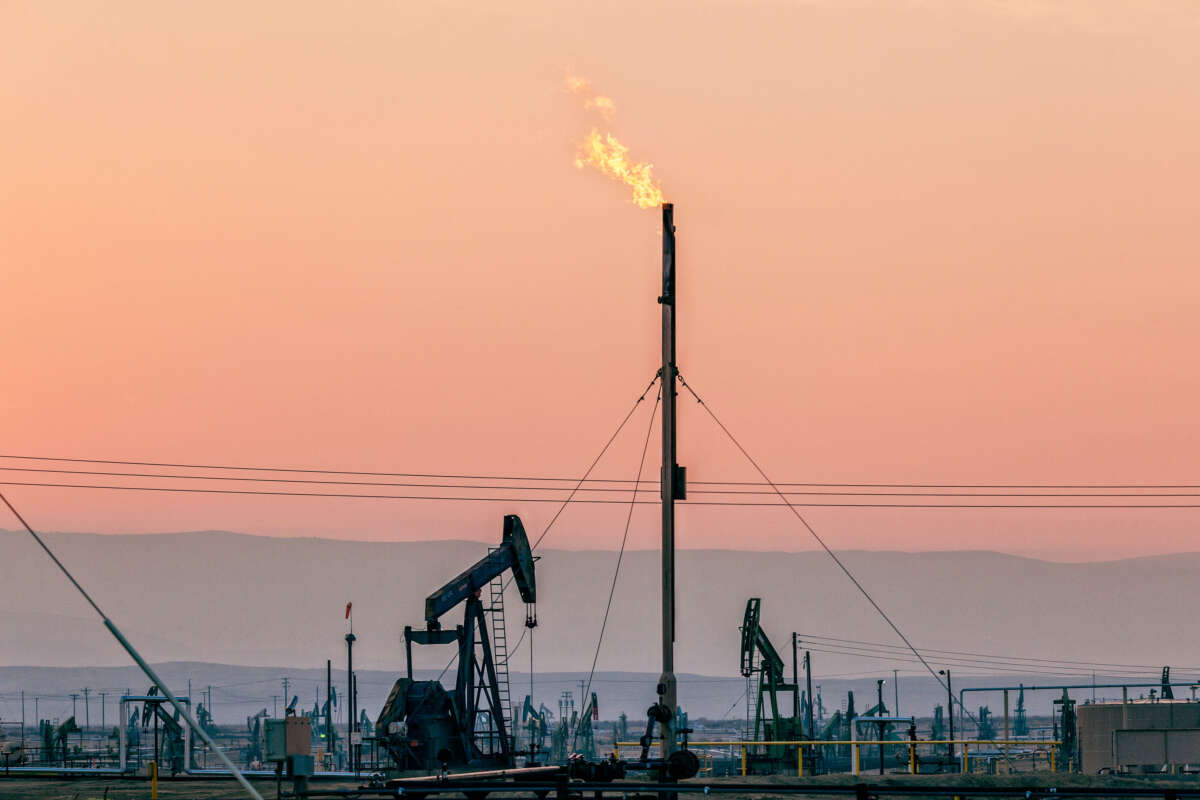Support justice-driven, accurate and transparent news — make a quick donation to Truthout today!
Fossil fuel-producing countries late last year pledged to “transition away from fossil fuels,” but a report on new energy projects shows that with the United States leading the way in continuing to extract oil and gas, governments’ true views on renewable energy is closer to a statement by a Saudi oil executive Amin Nasser earlier this month.
“We should abandon the fantasy of phasing out oil and gas,” the CEO of Saudi Aramco, the world’s largest oil company, said at an energy conference in Houston.
A new report published Wednesday by Global Energy Monitor (GEM) suggests the U.S. in particular has abandoned any plans to adhere to warnings from climate scientists and the International Energy Agency (IEA), which said in 2021 that new oil and gas infrastructure has no place on a pathway to limiting planetary heating to 1.5°C.
Despite the stark warning, last year at least 20 oil and gas fields worldwide reached “final investment decision,” the point at which companies decide to move ahead with construction and development. Those approvals paved the way for the extraction of 8 billion barrels of oil equivalent (boe).
By the end of the decade, companies aim to sanction nearly four times that amount, producing 31.2 billion boe from 64 oil and gas fields.
The U.S. led the way in approving new oil and gas projects over the past two years, GEM’s analysis found.
The oil & gas industry persists in development of new fields, as top producing countries boost production.
— Global Energy Monitor (@GlobalEnergyMon) March 28, 2024
Our latest report uncovers the regions driving the push for new fossil fuel reserves.
Learn more: https://t.co/zsmjvZavE8 pic.twitter.com/8KC5IJXoUY
An analysis by Carbon Brief of GEM’s findings shows that burning all the oil and gas from newly discovered fields and approved projects would emit at least 14.1 billion tonnes of carbon dioxide.
“This is equivalent to more than one-third of the CO2 emissions from global energy use in 2022, or all the emissions from burning oil that year,” said Carbon Brief.
GEM noted in its analysis that oil companies and the policymakers who continue to support their planet-heating activities have come up with numerous “extraction justifications” even as the IEA has been clear that new fossil fuel projects are incompatible with avoiding catastrophic planetary heating.
The report notes that U.S. Sen. Lisa Murkowski (R-Alaska) “supported ConocoPhillips’ Willow oil field, arguing that the Alaskan oil and gas industry has a ‘better environmental track record,’ and not approving the project ‘impoverish[es] Alaska Natives and blame[s] them for changes in the climate that they did not cause.'”
Carbon Brief reported that oil executives have claimed they are powerless to stop extracting fossil fuels since demand for oil and gas exists for people’s energy needs, with ExxonMobil CEO Darren Woods telling Fortune last month that members of the public “aren’t willing to spend the money” on renewable energy sources.
A poll by Pew Research Center last year found 67% of Americans supported the development of alternative energy sources. Another recent survey by Eligo Energy showed that 65% of U.S. consumers were willing to pay more for renewable energy.
“Oil and gas producers have given all kinds of reasons for continuing to discover and develop new fields, but none of these hold water,” said Scott Zimmerman, project manager for the Global Oil and Gas Extraction Tracker at GEM. “The science is clear: No new oil and gas fields, or the planet gets pushed past what it can handle.”
Climate scientist and writer Bill McGuire summarized the viewpoint of oil and gas executives and pro-fossil fuel lawmakers: “Climate emergency? What climate emergency?”
The continued development of new oil and gas fields, he added, amounts to “pure insanity.”
A terrifying moment. We appeal for your support.
In the last weeks, we have witnessed an authoritarian assault on communities in Minnesota and across the nation.
The need for truthful, grassroots reporting is urgent at this cataclysmic historical moment. Yet, Trump-aligned billionaires and other allies have taken over many legacy media outlets — the culmination of a decades-long campaign to place control of the narrative into the hands of the political right.
We refuse to let Trump’s blatant propaganda machine go unchecked. Untethered to corporate ownership or advertisers, Truthout remains fearless in our reporting and our determination to use journalism as a tool for justice.
But we need your help just to fund our basic expenses. Over 80 percent of Truthout’s funding comes from small individual donations from our community of readers, and over a third of our total budget is supported by recurring monthly donors.
Truthout has launched a fundraiser to add 460 new monthly donors in the next 8 days. Whether you can make a small monthly donation or a larger one-time gift, Truthout only works with your support.
